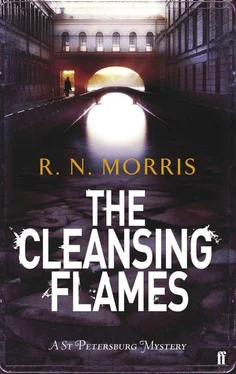R. Morris - The Cleansing Flames
Здесь есть возможность читать онлайн «R. Morris - The Cleansing Flames» весь текст электронной книги совершенно бесплатно (целиком полную версию без сокращений). В некоторых случаях можно слушать аудио, скачать через торрент в формате fb2 и присутствует краткое содержание. Год выпуска: 2011, ISBN: 2011, Издательство: Faber and Faber Fiction, Жанр: Исторический детектив, на английском языке. Описание произведения, (предисловие) а так же отзывы посетителей доступны на портале библиотеки ЛибКат.
- Название:The Cleansing Flames
- Автор:
- Издательство:Faber and Faber Fiction
- Жанр:
- Год:2011
- ISBN:0571259154
- Рейтинг книги:5 / 5. Голосов: 1
-
Избранное:Добавить в избранное
- Отзывы:
-
Ваша оценка:
- 100
- 1
- 2
- 3
- 4
- 5
The Cleansing Flames: краткое содержание, описание и аннотация
Предлагаем к чтению аннотацию, описание, краткое содержание или предисловие (зависит от того, что написал сам автор книги «The Cleansing Flames»). Если вы не нашли необходимую информацию о книге — напишите в комментариях, мы постараемся отыскать её.
The Cleansing Flames — читать онлайн бесплатно полную книгу (весь текст) целиком
Ниже представлен текст книги, разбитый по страницам. Система сохранения места последней прочитанной страницы, позволяет с удобством читать онлайн бесплатно книгу «The Cleansing Flames», без необходимости каждый раз заново искать на чём Вы остановились. Поставьте закладку, и сможете в любой момент перейти на страницу, на которой закончили чтение.
Интервал:
Закладка:
‘A poem? Good, yes. That is very plausible. Given Kozodavlev’s politics, it is not likely to be some verses of Pushkin. You remember what our young nihilist said. Boots over Pushkin. No, this was probably some radical manifesto, severely utilitarian in purpose. Many of them are written in verse, you know. I suppose the writers believe it will make their message more memorable. If the printed handbills are destroyed, the message will linger in the minds of those who have read it. Furthermore, it makes it easier to pass it on orally, if distribution becomes dangerous.’ Porfiry pulled open a drawer in his desk. ‘I have a small collection of such manifestos here. .’
‘ You? ’
‘Yes. I. Why does that surprise you?’
‘What possible reason could you have to collect such material?’
‘Oh, all the wrong reasons, you would undoubtedly say. But I am interested to know what people are saying. And thinking. Many of these are in wide circulation. I have had a number posted to me anonymously, or thrust in my hand by passing strangers. It is not so hard to acquire them, and not so easy to destroy them. One feels that they are too interesting to destroy, although one cannot always agree with the sentiments expressed. I am a magistrate, after all. I must acquaint myself with the doctrinal edicts of the state’s enemies, if they can be regarded as such.’ Porfiry gave Virginsky a quick warning look. ‘However, I must say that it would be quite another matter for anyone to harbour such a collection in the privacy of their own home. Magistrate or not. It is the fact that I keep my collection here, in my chambers, that makes it allowable. It is logged as official evidence, you see. There can be no unpleasant repercussions.’ Porfiry took out a couple of handfuls of printed sheets. ‘A rather tedious task for you, I’m afraid, Pavel Pavlovich. Sort through these and see if you can find a section that corresponds to our fragment. And well done, by the way. It was a breakthrough to perceive that it came from a poem.’
Virginsky frowned in bemusement as he took the manifestos from Porfiry.
*
It was a simple but laborious chore to look through the twenty or so pamphlets, isolating the beginnings of lines to find a sequence that matched the letters on the fragment. Almost all of the handbills were familiar to him from his own collection.
So when he found the poem he was looking for, it should not have been a surprise.
But it was worse than that. He felt a sickening vertigo. As soon as he saw it, he remembered his dream of the night before. For in the dream, he had held this very pamphlet in his hands as it caught fire, burning away the words as he read them.
He handed it to Porfiry without a word.
‘This is the one?’
‘Yes. There. The second verse.’ Virginsky recited from memory. ‘God is man-made, but no less real; / Of man’s fears, does he consist. / Stitched from such stern material, / No wonder God’s a Nihilist.’
‘I see. Yes. Well done. A strange work. God the Nihilist.’ Porfiry shook his head wonderingly. ‘Perhaps he is. On days like this, one cannot help wondering.’
Virginsky’s voice faltered as he asked: ‘D-do you. . do you remember where you got this?’ After a beat, he added, redundantly: ‘Who gave it to you?’ He held in his own mind an image of the hatchet-headed man.
Porfiry leaned back in his seat and sighed. ‘My memory is not what it used to be. That is in itself a cause for concern, Pavel Pavlovich. The investigator’s memory is one of the chief weapons in his armoury. One must not only be able to hold on to the details of the current case one is investigating, but one must also be alert to ripples of connection from past cases. Criminals do not burst forth spontaneously. They are like the spring buds. They give the appearance of spontaneous generation, but the plants that bear them may have taken root long ago.’
‘Yes,’ said Virginsky, shortly. ‘I know that. You do not need to talk to me in this way. I am not a pupil in need of instruction.’
Porfiry looked aghast. ‘Forgive me, I meant no offence. I am a foolish, forgetful old man. One falls into habits. And habits are by definition bad. I have acquired the habit of talking down to you. Whenever I succumb to it, you must reprove me, in the harshest possible terms.’
Virginsky shook his head impatiently. ‘So you cannot remember who gave it to you?’
‘In essence, no.’
Virginsky constricted his mouth and turned his back on Porfiry, as if in disappointment.
*
That night, Virginsky lit the tallow candle and pulled the tin trunk out from under his bed. He took the key from a drawer in his bedside table. He did not need to open the trunk to know that it was in there. He did not need to look at it, nor hold it in his hands.
Yet he did.
His dreaming mind had been right. He had known all along.
He stared at the lines of doggerel without reading them. Virginsky had to accept that his mind, in its totality, was a monstrously larger entity than his consciousness. It did most of its work without his knowing anything about it. This need not alarm him, he decided, although he was uneasy about the surrender of control that it implied. His emotions were racing to keep pace with his thoughts. A surge of panic was overtaken by anger: he would not relinquish his claims to be a rational being. On the contrary, his rationalism now had to encompass this newly recognised and undeniable fact. Calmer now, he realised that he must seek to grasp with conscious thought what his unconscious mind had been up to.
In the first place, there was the question of his resistance to opening the trunk the previous night. It would have been a simple matter to have looked inside, thereby confirming one way or another the solution which his dreaming mind had apparently furnished. A simple matter, and not at all irrational, for that was the only logical way to settle the question and restore his mental equilibrium. To confront his unconscious.
The irrational act had been to push the trunk back under his bed without looking inside.
It could only be that his unconscious mind had sensed the connection between Kozodavlev and the hatchet-headed man who had given him the manifesto. But why should that have provoked this strange reluctance? Of course, the answer to that was that opening the trunk and taking out the manifesto would have inevitably drawn Virginsky into the case they were investigating, and not simply as an investigator. His conversation with the hatchet-headed man would have come under scrutiny, as well as his motives and intentions at the time. He would have been forced to reveal far more of himself than he wished to, or was sensible.
The crux of the matter was this: the man had told him that he should look for him in the taverns around Haymarket Square. To pass this on to Porfiry Petrovich was tantamount to informing on him. Virginsky may have been a magistrate, but he was not yet ready to become an informant.
Furthermore, he himself, inevitably, would have been embroiled in whatever plan Porfiry came up with to catch the fellow.
To have opened the trunk and looked inside would have hastened the moment that Pavel Pavlovich Virginsky was finally made to choose between his principles and his conscience; the moment, in short, when he would have to decide who he was.
His principles and his conscience. It was unnerving to think that they were not one and the same. But when he tried to give shape to his principles, he had a vision of marvellous beings — very different from the grubby, venal populace of the day — living in vast communal phalansteries, which his imagination modelled on the Crystal Palace of the Great Exhibition in London. All would be equal. Every need would be met. Hunger, poverty and therefore crime would be at an end. The old institutions of church, marriage and the family would be dismantled. Women and men would be free to think — and love — as they wished. According to the principles to which he ascribed, whatever had to be done to bring about such a future was justified.
Читать дальшеИнтервал:
Закладка:
Похожие книги на «The Cleansing Flames»
Представляем Вашему вниманию похожие книги на «The Cleansing Flames» списком для выбора. Мы отобрали схожую по названию и смыслу литературу в надежде предоставить читателям больше вариантов отыскать новые, интересные, ещё непрочитанные произведения.
Обсуждение, отзывы о книге «The Cleansing Flames» и просто собственные мнения читателей. Оставьте ваши комментарии, напишите, что Вы думаете о произведении, его смысле или главных героях. Укажите что конкретно понравилось, а что нет, и почему Вы так считаете.












